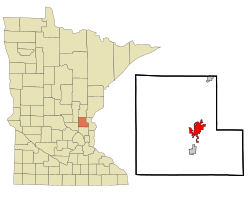Cambridge, Minnesota
| Cambridge, Minnesota | |
|---|---|
| City | |

The original Isanti County Courthouse in Cambridge MN
|
|
| Nickname(s): "Minnesota's Opportunity Community" | |
 Location of the city of Cambridge within Isanti County, Minnesota |
|
| Coordinates: 45°33′52″N 93°13′42″W / 45.56444°N 93.22833°W | |
| Country | United States |
| State | Minnesota |
| County | Isanti |
| Area | |
| • Total | 7.68 sq mi (19.89 km2) |
| • Land | 7.46 sq mi (19.32 km2) |
| • Water | 0.22 sq mi (0.57 km2) |
| Elevation | 961 ft (293 m) |
| Population (2010) | |
| • Total | 8,111 |
| • Estimate (2012) | 8,217 |
| • Density | 1,087.3/sq mi (419.8/km2) |
| Time zone | Central (CST) (UTC-6) |
| • Summer (DST) | CDT (UTC-5) |
| ZIP code | 55008 |
| Area code(s) | 763 |
| FIPS code | 27-09370 |
| GNIS feature ID | 0640789 |
| Website | www.ci.cambridge.mn.us |
Cambridge is a city in Isanti County, Minnesota, United States, located at the junction of Minnesota State Highways 65 and 95. The population was 8,111 at the 2010 census. It is the county seat of Isanti County. It is located along the Rum River and the BNSF Railway. Cambridge is notable for having the highest percentage of Swedish Americans of any city in the United States with a population of over 5,000 people.
The city of Cambridge was established in the late 19th century along the railroad from Minneapolis to Duluth. It was named by, and originally settled by, immigrants from New England. These were "Yankee" settlers, that is to say they were descended from the English Puritans who settled New England during the colonial era. The same population founded and named the town of Princeton nearby. Later on the surrounding area would be heavily populated with Swedish, German, Irish and Norwegian immigrants.
The city of Cambridge was incorporated in 1876.
In the early 20th century, Cambridge had a potato starch factory, a 1,301-barrel flour mill, a wool carding and spinning mill, an electric lighting plant, and local and long-distance telephone systems.
...
Wikipedia
